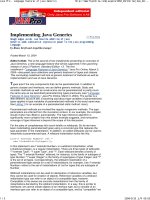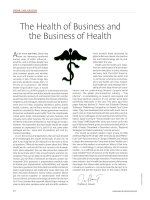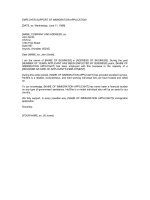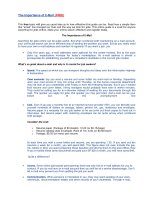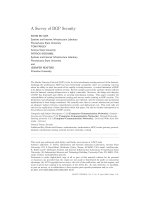Tài liệu DBA Doctor of Business Administration pptx
Bạn đang xem bản rút gọn của tài liệu. Xem và tải ngay bản đầy đủ của tài liệu tại đây (904.17 KB, 8 trang )
DBA
Doctor
of Business
Administration
www.sbs.edu
certifiedAccredited
Many now hold to the proposition that the DBA is to the 21st century what the MBA was to
the latter half of the 20th century. Without engaging in that debate it is certainly the case that
work environments face challenges without historical precedent. Business and government
leaders
everywhere are confronted by novel situations for which past theories, practices and
strategies do not seem to provide the answers. Change continues to accelerate and the
impacts of globalisation, at once profound and subtle, affect all institutions and organisations.
No longer can leaders be contented simply to apply knowledge, they must lead the generation
of knowledge in their own organisations that informs practice and policy peculiar to their
circumstances. In other words, business leaders today must be able to lead the conduct of
work related research. This DBA is designed to equip candidates with this capability.
The SBS International Doctor of Business Administration (DBA) offers an option for
organisations and individuals looking to improve their business performance through the
development of a superior capacity to investigate and resolve organisationally based, while
designing and carrying out original research.
It equips senior managers with the skills to apply current research methodology to issues of
corporate concern and enhances candidates’ research and consultancy skills.
We invite you to consider the many benefits the SBS DBA part-time program will provide for
your career.
Dr. Charles Mercieca
Honorary President
Welcome from the Honorary President
The mission
of the institution is
to educate individuals
who will contribute
to the management
and leadership of
global organisations.
3
DBA vs PhD
The DBA differs from a Doctor of Philosophy (PhD) through its focus on practice, policy
or strategy, within the context of the individual’s workplace. Both doctorates involve the
development of substantial original work. However, a professional doctorate such as the DBA
requires a different type of research development from that of the PhD. For a PhD, research
needs to make a significant contribution to an area of knowledge. For the DBA, research
needs to make a significant contribution to practice, policy or strategy. The research involved
in the DBA is applicable to business issue(s) and is carried out in the context of professional
practice.
Features of our DBA
PURPOSE
The Doctor of Business Administration program attempts to bring theory and practice to
bear on decision making in complex organizations in order to help these institutions adapt to
change and lay the foundations for long term survival.
OVERVIEW
In the DBA program, industry and academic professionals build upon the master’s level core
skills and knowledge to develop a higher level of competence in conducting applied research,
in comprehension of theoretical and applied literature in a chosen business discipline, and
in the attributes essential to university teaching. The DBA graduate will have developed
critical knowledge and skills for success in college and university teaching, in service to
the profession and the community, in future professional development, and in attaining
credentials and skills essential to business consulting and management.
The DBA degree program is designed to meet the special requirements of working academic
and business professionals who have the motivation to expand their knowledge and skills
to meet the changing needs of modern organizations. The program is designed to serve the
needs of capable students, regardless of their concentration.
Doctoral studies are designed to permit busy professionals to balance the demands of
career and family. Students meet the program’s requirements by completing courses, during
weekends, and online work.
The DBA graduate
will have developed
critical knowledge
for success in teaching,
business consulting
and management.
4
key reasons why you should consider the SBS DBA
There could be many reasons why you are contemplating taking on an international DBA
program. Perhaps it has always been your dream to reach the pinnacle of tertiary education.
It could be the challenge of conducting indepth research in an area you are passionate about,
plus the satisfaction of contributing to the world of knowledge and professional practice.
Perhaps
your quest is for personal development and career advancement.
Whatever your reasons, taking on the challenge of a world-class doctorate program is possibly
one of the most important decisions you will ever make. Here are several key reasons why the
SBS International DBA is a winning program.
SBS’s reputation
SBS has a reputation for excellence in management and business education. Our School is
fully accredited by the International Assembly for Collegiate and Business Education. We are
Eduqua certified, which is the Certification Body Higher Education in Switzerland.
Our professors are leaders in research and practice, allowing our participants to excel in the
various topic areas.
SBS has strong links with industry through its collaborative research links.
Effective Learning Resources
A key ingredient for successful learning at Doctoral level is the availability and access to
information. SBS’s extensive learning package consists of textbooks, electronic readings,
research papers and guidebooks. In addition, you can make full use of SBS’s vast library
resources including its massive online databases for instant access to thousands of full text
journals, research papers, abstracts, conference proceedings and news articles. These online
resources facilities are reputed to be among the world’s best.
Impressive Learning Outcomes
The end result of going through this rigorous DBA means you develop not only cutting-edge
knowledge and expertise, but you could also establish sound capabilities in management
consulting, in-company action research as well as, academic research leading to publication
of work in internationally acclaimed refereed journals. Candidates are assessed by 50%
course work and 50% research work.
Flexibility
The program can take a minimum of 2.5 years to complete but a maximum duration of up
to six years may be allowed. With coursework delivered over weekends you can continue
to work in a full-time job. Course workshops are time tabled in advance every two months.
So you can schedule them into your calendar. Time flexibility – a vital feature that busy
professionals truly appreciate.
SBS has a reputation
for excellence
in management
and business
education.
5
Course Information
Program Structure
The Doctor of Business Administration
is an integrated coursework and
research program that may be
completed in a minimum of two and
a half years.
The coursework component consits of
the first year. Courses are conducted
in the classroom in an intensive
workshop model with face-to-face
contact. All courses are assessed by
written assignment.
The transition between the course-
work phase and the research phase
is by the candidate satisfactorily
completing the set of assessed
Research Proposals (one for each
research project).
On satisfactory completion of the
coursework units that are scheduled
over the first year, candidates enter
the research phase where they
undertake individual, supervised
research projects. The output of each
research project is a research paper
of publishable style and quality.
The portfolio of research papers is
submitted for external examination.
DBA Schedule
First Year Course Units
Semester 1 Management Research Perspectives 4.5
Information Technologies for
Business Research
4.5
Global Environments and Management
Trends
9.0
Critique Analysis of Research 9.0
Semester 2 Contemporary Management 9.0
Research Methods in Business &
Management
4.5
Management Research Design &
Methodologies
9.0
Preparation and Presentation of a
Research Proposal
4.5
Note: For successful candidates, the Master of Applied
Business Research is awarded.
Notes
A dissertation may be submitted
in place of Papers 1 and 2 or
alternatively other forms of scholarly
writing may be accepted subject to
the approval of the Program Director.
Examination process is dependent on
the mode of submission of final work.
Where a paper-based submission has
been chosen, successful completion
of the DBA is by both papers being
accepted for publication by an
International refereed journal that
has been approved by the Doctoral
Panel. These journals are found on an
approved list which may be changed
from time to time.
• Where dissertation-based
submission (or other than by
publication) has been chosen,
successful completion of the DBA
is by external examination by two
independent experts in the area
of the research study. These
examiners must be approved
by the Doctoral Panel at least 3
months before submission.
• Themaximumcompletiontimeis
4 years. Extension may be applied
for between the minimum time
of one and a half years (11⁄2)
and the maximum time of four
years (4) subject to approval by
the Doctoral Panel but extension
fees apply. Extension beyond
four years will only be granted
in special circumstances and
by written application to the
Doctoral Panel.
The DBA is a full fee-paying program.
Students must have ready access to
a modern computer (with appropriate
software), electronic mail, Internet
and use of microphone/speakers or
headset.
Continuing enrolment in the program
is subject to satisfactory progress
which is reviewed each six months
by supervisors and the Doctoral
Panel.
1. The program is scheduled and
timetabled so that it is suitable
for candidates who maintain
their full-time professional work.
2. Candidates must satisfactorily
complete each phase before
proceeding to the next phase.
3. Candidates who satisfactorily
complete the coursework phase
only may exit the program with
a Master of Applied Business
Research.
During the research phase there will
be structured meetings between
candidates and supervisors based on
agreements between the parties.
DBA Schedule
Second Year
Course Units
Semester 1 Doctoral Research Project 9.0
Proposal Literature Review 9.0
Semester 2 Doctoral Research Paper 1 18.0
Third Year Course Units
Semester 1 Doctoral Research Paper 2 18.0
Note: Instead of papers, candidates may write
a dissertation of 40,000 words.
6
DBA Admissions Requirements
Applicants seeking admission to the DBA program shall normally hold:
• AnMBAdegree,orequivalent,fromanapproveduniversityorequivalent;
or
Where other masters degree level qualifications are held, applicants may be asked to
complete a prescribed bridging program (normally designated courses from an MBA
program);
or
an appropriate honours degree or bachelor degree with honours of at least 2A standard
fromanapproveduniversityorequivalenthighereducationinstitution;
and
• Substantial(nolessthanveyears)experienceatexecutive/managementlevel.
All DBA candidates must be able to demonstrate their education and/or professional
performance to undertake research at a doctoral level. They should be able to show
success in their career to date and document how the DBA program fits into their personal
or career plans for the future.
• AllDBAapplicantsmustsubmita1,000wordoutlineoftheirproposedresearchtopic/
idea as part of their admission application submission.
• AllDBAcandidatesmusthaveasoundcommandofEnglishlanguage,spoken&written,
asevidencedbythecriteria:HavingcompletedaMastersdegreeinEnglish;
or
Submit proof of having achieved a TOEFL score of minimum 90.
The final decision concerning the eligibility, acceptability of qualifications and research areas
for the DBA Program rest with SBS Swiss Business School. All applicants must have Email/
Internet access throughout the program.
Faculty
Our lecturers know you have business
commitments. Most of our lecturers are
also consultants and business people,
so our program isn’t just academic, it
is dynamic!
Dr. Mostefa Ider
PhD (Laval University), Canada
Management Research Perspectives
Dr. Susan Fitzpatrick
DBA (UniSA), Australia
Global Environments and Management
Trends
Dr. Andrew Blatiak
PhD (University of Surrey), UK
Contemporary Management
Dr. Pierre Kohler
PhD (ETH/EPFL), Switzerland
Research Method in Business &
Management
Dr. Partrick O’ Leary
PhD (University of Iowa), USA
Panel Leader
Associate Professor Craig
Shoemaker
PhD (University of Iowa), USA
Panel Leader
Associate Professor Joseph Mula
PhD (Griffith), Australia
Information &Internet Technologies
for Business Research
Dr. Carl-Gustaf Malmström
PhD (University of Helsinki), Finland
Management Research Design and
Methodologies
Dr. Elena Kasimovskaya
PhD (University of Moscow), Russia
Panel Leader
7
Course Units
Course 1: Management Research
Perspectives (4.5 units)
This course inducts candidates to the
nature of research and commences their
learning journey through the business
administration and management
field using the rigorous research
perspectives of the scholarly tradition.
As such, it explores the development
of doctoral programs, their place in
business-academic interface, and their
position at the upper levels of university
endeavour. It reinforces the notion
of a history to the study of business,
the development of management
as a discipline of study and its
interconnections with other disciplines
of learning. It examines the perceived
differences between practical research
for day-to-day operational business
matters and scholarly research that
results in original and/or added value
contributions to the practice of business
and management.
Course 2: Information & Internet
Technologies for Business Research
(4.5 units)
In today’s research world, it is imperative
that the research utilize information and
Internet technologies effectively and
efficiently. The information technology
tools can provide efficiency gains
in recording and tracking reference
sources and completing research
papers. Internet provides a wealth of
research information to be tapped but
can also be a trap if the researcher
cannot use appropriate search engines
and techniques effectively. This course
will equip the researcher with tools and
techniques for undertaking a research
project.
Course 3: Global Environments and
Management Trends (9.0 units)
In an ever globalised world,
management has become more
challenging. The modern manager
needs to be aware of movements in
the global environments not only in
their industry but across industries
and continents. This in turn will affect
their management decision making and
lead to strategies that will respond to
the changing business environment.
In order for managers to be able to
be effective, they need to broaden
their understanding of changing global
trends and management’s response.
(Pre-requisite: Course 1)
Course 4: Critical Analysis of
Research-based Literature (9.0 units)
A key competency in doing research is
being able to accurately comprehend
what others have written on the topic
about to be investigated. This course
focuses attention on how to analyse
and critically assess the research-
based literature by asking candidates
to review examples, preferably related
to their chosen topic and develop
dependable approaches to research
question formation, methodological
development and the presentation
of research findings. (Pre-requisite:
Course 1)
Course 5: Contemporary
Management (9.0 units)
All academic research is a discourse
with the literature, that is, the current
understanding of management change
and cross-culture impacts. The course
extends candidates understanding
of the literature and furthers that
understanding by reference to the
literature and contemporary research
within the primary discipline of the
candidate’s interest. (Pre-requisite:
Course 3)
Course 6: Research Method in
Business & Management (4.5 units)
It is expected that students would
have had little interaction with the use
of the scientific method in conducting
research. This course introduces the
main research methods adopted in
business and management research.
As background context, the general
nature of evidence-based and ethical
research is examined before focusing
attention on the two major paradigms
of investigative knowledge: quantitative
and qualitative research. (Pre-requisite:
Course 1)
Course 7: Management Research
Design and Methodologies (9 units)
The purpose of this course is to help
students focus on a realistic topic
and design the research study in
accordance with sound principles and
good practice. It extends the knowledge
and skills required to research business
and management issues. Specific
attention is paid to individual methods,
such as the population survey, focused
interviews, case study and action
research. As these various approaches
are frequently used in management
research, an understanding of their
strengths and limitations is also
examined. Extensive use will be made
of technology tools for undertaking
analyses of qualititative and quantitative
data. (Pre-requisite: Course 2, Course 6)
Course 8: Preparation and
Presentation of a Research Proposal
(4.5 units)
The capstone course will ensure that
a student can integrate the learning
from this program into a well argued
and documented research study that
is embedded in the research literature.
It will also articulate the conceptual
framework/model, the research
questions, and the data collection and
analysis methodologies. The research
proposal will be a key measure of the
student’s ability to undertake doctoral
research. (Pre-requisites: Course 4,
Course 7)
8
How to find us?
Zurich has been consistently ranked
as one of the top cities for quality of
life and voted 7th best student city
worldwide.
By Public Transportation
The train station Kloten Balsberg can be reached from
Zurich Main Station with Zurich’s rapid transit
system line S7 direction Winterthur. Kloten Balsberg
is a three-minute walk from SBS.
There are bus connections (the bus stop is located
in front of the SBS building) to Zurich Airport.
Glattbrugg, Kloten, Oerlikon, and other places in
the Zurich North area, the best connected region by
public transportation nationwide.
Walking
You can walk to or from Zurich Airport or Kloten’s
city center to SBS Swiss Business School in 15
minutes.
By Car
SBS is located near the highway between Zurich and the
airport. Coming from all directions, take the highway to
Zurich Airport, take the exit Glattbrugg. Turn right at the
first traffic signal and take a left turn at the following traffic
signal. SBS will be on the right after approximately 600
meters. We are located in building C on the 2nd floor.
Parking
You can use the visitor paying parking space, in front of
building A. For visitors and students an alternative parking
facility can be found at P60.
Address
SBS Swiss Business School
Balz-Zimmermann-str. 34-38, Building C
CH-8302 Kloten-Zurich
Phone: +41 44 880 00 88
Fax: +41 44 274 27 65
E-mail:
Office Hours
Mon - Fr: 08:30 AM - 06:00 PM
Saturday 08:30 AM - 12:30 PM
Follow SBS on Social Media
Facebook: www.facebook.com/SwissBusinessSchool
Twitter: www.twitter.com/SBSEDU
Linkedin: www.linkedin.com/company/sbs-swiss-business-school
Youtube: www.youtube.com/
Google+:
Airport
ABC Airport
Business Center
Hotel Hilton
Glattbrugg/Kloten
Kloten-
Bals
berg
SBB
Mövenpick
Hotel
von
Glattbrugg
Stadt
Kloten
Balsberg
Rietho
fstrasse
Flughofstrasse
Unterrietst
rasse
Rohr-
Str.
SBS Swiss Business School reserves all rights to change its rules and regulations at any time. SBS Swiss Business School will accept no liability or obligations if the courses
described in SBS prospectus are not provided. However, SBS will take such steps as are available to it to minimize the effect of any alterations or withdrawal of a course.
Such steps may include the offer of a place on an alternative course.
